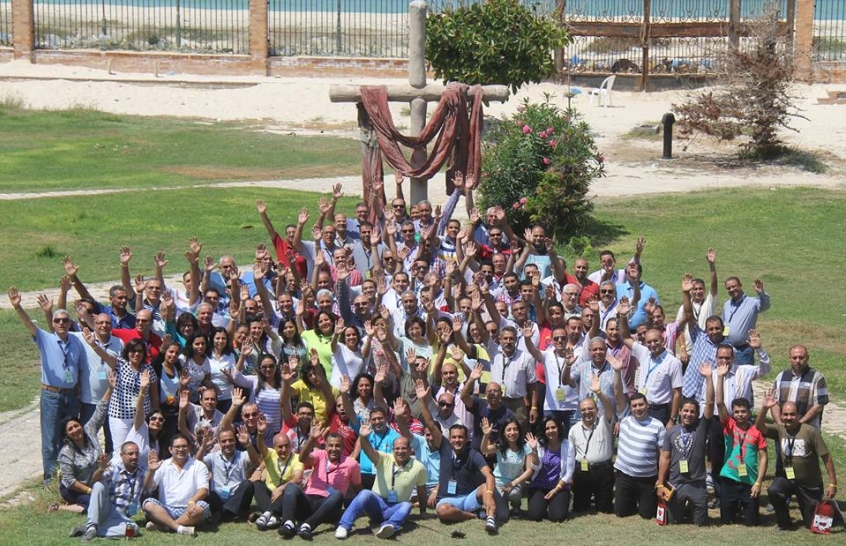
Christians in Egypt have an 'insatible desire' for the Bible and there is far more to them than their current image as a persecuted minority, according to Egypt Bible Society director Ramez Atallah.
'We can't keep up with the insatiable desire of Copts to have a Bible, he says in an interview with Evangelical Focus. And he says the level of danger in Egypt is not much greater than in Europe, adding that there are 'probably more terrorists' in England than in Egypt.
Speaking while attending the European Leadership Forum conference in Poland, two days before the slaughter of another 29 Copts while travelling to a monastery in Minya, Atallah urges tourists to return to Egypt.
'We are getting very few tourists, and the reason for this is that people think it is a very dangerous place to go. But the only tourists that have been killed in the last three years were two tourists from South Korea that were in Northern Sinai, a place to which people are not really allowed to go, because it is a very dangerous area.
'But Sharm El Sheikh, Luxor, Aswan, Cairo, and other places… nobody has been hurt there. So we do not understand the reason of this boycott of Egypt. When a terrorist attack happens in Manchester, which is similar, and just as bad, nobody thinks of not going to England.
'And there are probably more terrorists in England than in Egypt, because there are a lot of disgruntled people in England who could very easily be taken on by ISIS. So, we think it is a bit unfair that our country is boycotted, and considered very dangerous, even though the level of danger is not much greater than in any other European country.'
He admits that Christians in other places see Egypt as a place where Christians are being persecuted.
'A bomb in a church is certainly a bit different than a bomb in a rock concert. But for the Muslim mind, in both cases they are attacking Christians. For them, anybody that is from a Western culture, and is not Muslim or Jew, is a Christian. In the mind of ISIS, there is not a great difference between killing people in a church and kill them in a rock concert.
'In Egypt, if they put a bomb in the streets, they will kill more Muslims than Christians, because Christians are 10 per cent of the population. In general, they do not want to kill Sunni Muslims. They may want to kill Shia Muslims. So, the reasons to put a bomb in a church is to make sure that all the victims are Christians.
'But when they attack a rock concert in Manchester, they assume that all these people are Christians. So, for ISIS, it is very much the same mentality from ISIS' point of view, but these attacks are completely read differently by the Western mind.'
He also says the Copts have 'great freedom' in Egypt.
'It is true that there are things that you can do in the West which you cannot do in a Muslim majority country, but these things, for those living in Egypt, are not a big hindrance. For instance, in Egypt, you cannot go on the streets and distribute Christian literature, but we have 16 bookshops in the main cities of Cairo.
'You can go there anytime and buy a book. We also can rent any book table at any book fair and sell Scriptures. So, we have tremendous freedom. The one thing we cannot do is going out and giving free literature, and because of that, it is seen like "oh, this is a persecuted minority and they do not have our freedoms". The West at times fights blindly for some freedoms that we do not care about very much, because there are more important issues.'
He describes Western societies as 'really very anti-evangelical'.
And while the Bible Society's Christian bookshops have been attacked in Egypt, he says these attacks were political not religious.
They were 'not an attempt to stop the Bible being sold in Egypt' but an attempt to create chaos.
There are 10 million Christians in Egypt and the Coptic Church is very, very committed to the Bible, he adds.
'We can't keep up with the insatiable desire of Copts to have a Bible. As I am talking to you now, there is a big event happening in Egypt with thousands of young people, a Christian festival this week. And we are selling lots of Scriptures, we have a large event in a tent for youth, Scripture competitions, "talent shows" on biblical themes. The activities happening in summer are incredible. The churches are incredibly busy, because school vacations are very long (from May to September). Parents work, and churches do not want their children on the street. So, every day, churches have clubs. Young people go and spend the whole day there. They play games, study Scripture, and attend services. I am talking of thousands, one church in Egypt has 10,000 children in their Sunday school, we are talking about very large numbers.'
He also welcomes a new law which has allowed church building to be freed up and churches to publicly declare the places they had for worship which were undeclared. Many underground churches have now become legal. In addition, the government is offering a place of worship for every Christians confession: Protestants, Orthodoxes and Catholics.
The problem, says Atallah, is that there are seven Catholic denominations, 18 Protestant denominations and three Orthodox. 'The government is not offering one place for every denomination but one for every confession. So, the issue is, who is going to get it? Will the Baptists get it, or the Pentecostals, or the Methodists? This is still a problem to work through, but it is understandable: they do not want 18 Protestant churches in a small place.'













